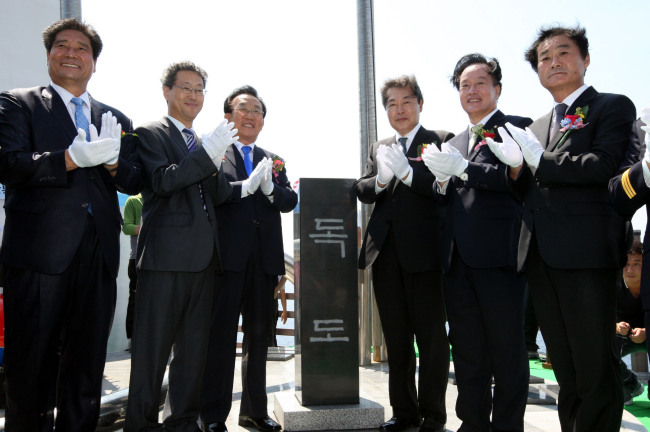 |
Public Administration and Security Minister Maeng Hyung-kyu (third from right) and other participants on Sunday celebrate the erection of a monument on Dokdo. The 1.2-meter-tall monument is inscribed in Korean with “Dokdo” on its front and the “Republic of Korea” on the back. (Yonhap News) |
Amid spiraling tension, South Korea is considering reasserting its ownership of Dokdo in response to the Japanese prime minister’s letter which expressed regret about President Lee Myung-bak’s recent trip to the islets, Seoul officials said Sunday.
Officials here have been grappling with how to respond to the dispatch delivered via the Korean Embassy in Tokyo on Friday. Yoshihiko Noda also expressed regret about Lee’s calls for Emperor Akihito’s apology for Japan’s colonial atrocities.
The unprecedented visit on Aug. 10 to the windswept islets in the East Sea prompted Tokyo to renew its decades-long ambition to take the case to the International Court of Justice.
“I think we should reply to the letter given that it is inappropriate to send it back or not answer at all,” a senior official at the Foreign Ministry said.
Another official said nothing has been set yet but the government will soon come to a decision given its clear stance on the subject.
Seoul is forecast to fix the timing of the letter’s delivery and level of its argument after Japan’s Cabinet meeting on Tuesday. Noda and his aides reportedly plan to discuss extra retaliatory action such as calling off an envisioned expansion in a currency swap deal between the two countries to $70 billion from $13 billion.
Japan’s Sankei Shimbun newspaper reported last week that Tokyo is considering not backing Seoul’s bid to become a non-permanent member of the United Nations Security Council for 2013-14 when a general assembly opens in October.
Tokyo is also expected to document its demand for an ICJ trial via a diplomatic letter this week. Seoul brushed aside its verbal proposal last week, reiterating that the islets are its territory “historically, geographically and under international law.”
“Our policy is to handle a territorial issue as a territorial issue (and not to mingle it with other areas) but we don’t have to anticipate what will come out of the meeting,” a ministry official told The Korea Herald.
On Sunday, Public Administration and Security Minister Maeng Hyung-kyu and other senior government officials and lawmakers landed on the islets to set up a headstone as an “emblem of the country’s sovereignty and spiritual safeguard for Dokdo.”
Lee engraved “Dokdo” in Korean on its front and the “Republic of Korea” on the back of the 1.2-meter-tall memorial.
Japan illegally seized the islets in 1905 prior to its full-blown occupation of the Korean Peninsula. Seoul recaptured them following its independence in 1945 and deployed a small batch of coast guards there.
The archipelago nation has for decades repeated the claim via school textbooks, diplomatic and defense papers and other methods. Many Koreans couple the imperial past with its territorial assertion, recurrent distortion of historical facts and failure to apologize for sex slavery and forced labor during World War II.
The recent series of tit for tat moves has catapulted bilateral relations to their lowest ebb since their normalization in 1965. Public sentiment soured further, driving civic groups and far-right activists to stage rallies around the two countries.
Concerns are growing that the ties may enter a vicious circle in which diplomatic rows spark popular anger and then spill over to derail brisk economic cooperation and cultural exchanges. Scholars and experts have been calling on the two countries to focus on basic values and work together for a more constructive future.
With key elections drawing near in both countries, however, politicians will likely continue to flex their muscle to help perk up voter sentiment and tackle domestic rivals, observers say.
By Shin Hyon-hee (
heeshin@heraldcorp.com)








